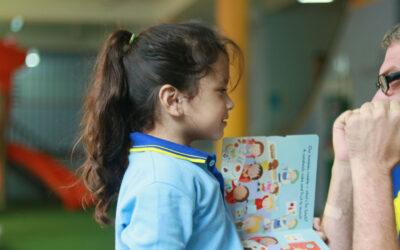As parents, as much as it pains us to say it, we will not always be there for our kids.
You can’t trail behind your middle schooler in the hallways to ward off bullies. You can’t force the basketball coach to add your high schooler to the team roster after they had a bad try-out. And you can’t always be there to comfort your college-aged baby when they don’t do well on a test.
However, there is something you can do to prepare them for unexpected and unfortunate moments in their lives:
You can train your child’s brain for happiness and strength. In other words, you can raise mindful kids.
Mindfulness means being away from your moment-by-moment experiences. When a kid learns to be mindful, their emotional intelligence can soar.
You can give them the tools they need to work through losses, bounce back from disappointments, and be emotionally strong enough to take on any challenges they face.
Starting at a young age, you can do these 5 simple things to raise children with strong emotional intelligence skills and ingrain core values. In-turn, their brains will be wired for happiness.
1) Teach Them to Label Their Emotions
Growing evidence suggests that it is difficult to identify and label the variety of emotions we experience at any given time.
Honest, Simple Parenting Advice
In fact, in one poll 60 percent of interviewed college students said they did not feel emotionally prepared to deal with negative feelings such as anxiety and disappointment.
You may hear a child express that their ‘belly hurts’ when they are anxious. Or if you ask how their day was they may answer with “good” or “fine”. Encourage them to really express how they are feeling. Commonly ask things like:
- How did that make you feel?
- When that happened did you feel excited or upset?
- Do you think your belly hurts because you are nervous about something?
You can model this behavior for them by commonly speaking about your feelings.
Teaching them to talk about their emotions will help wire their brains to understand their own queues and acknowledge their feelings.
2) Practice and Encourage Gratitude
Teaching your children to be grateful and appreciative is an important factor in their future happiness.
In fact, many studies have linked gratitude to improved physical health, better sleep, improved self-esteem, and overall happier adults.
In fact, neuroscientists have actually shown that the brain is rewired when gratitude is practiced.
You can teach your child gratitude by encouraging manners and frequently asked questions for them to reflect on, such as:
- Tell me about a time someone was nice to you.
- What is your favorite thing about living in this house?
- What are you looking forward to?
- Tell me about a time when someone gave you something that you loved.
- Describe a time when you were upset and someone made you feel better.
3) Talk Through Positive Actions
Use small failures, losses, or disappointments as teaching opportunities.
Whether in school, a sporting event, or even a board-game, support them through the loss and help them understand that this is a part of life. Teach your children to lose elegantly, congratulate opponents (if it applies), and work hard. When things don’t go as planned, discuss what they can do in the future to prepare differently or practice harder.
You can also talk through positive solutions for hypothetical problems. For example, I will occasionally ask my children things like:
- If you saw kids at recess making fun of another kid, what would you do?
- If you did badly on a test, what would you do next time to prepare?
- If someone dropped their books in the hall at school, and helping them would make you late for class, what would you do?
When we hover over children and guide them away from every little threat, we are not preparing them for the world ahead of them.
Let them fall and scrape their knee. Allow them to work out an argument with their friend or sibling. Give your children the opportunity to learn how to problem-solve.
Lastly, if they come to you for help, don’t just solve their problem for them. Talk through three possible solutions to their problem, and what they think would be the best course of action.
5) Teach Responsibility
Prepare your child for future responsibilities by introducing them to chores. Research suggests that children who do chores have higher self-esteem, are more responsible, and are better equipped to deal with frustration. Additionally, these skills can lead to greater success in school, work, and even relationships.








